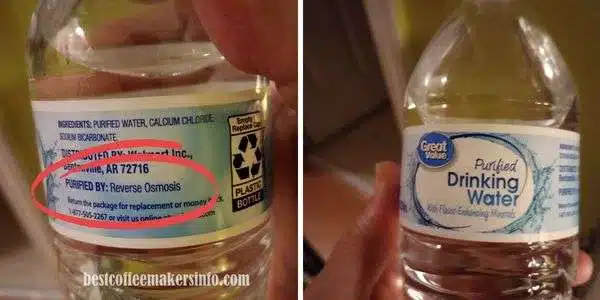
Now we’re going to talk about in this post the different types of water out there and how it can affect your brewer’s performance long-term. Hard to believe, but a great tasting cup of coffee is actually 98% water – amazing huh? So it stands to reason that you want to know how to have the best tasting water to make it work.
Everybody knows that pure water is best to drink, and so what will be going into your coffeemaker should be no different. With a single cup brewer you want to make sure you’re using the best kind of water because internal buildup can cause serious problems over the long haul with the internal working parts. When minerals that occur organically in a water supply accumulate; this leads to a need to “descale” your brewer.
There’s a lot to water maybe more than what you might have learned from science class. So let’s dive in now.
[toc]Water Chemistry Explained
Have you heard the term “hard water” and wondered what that means? Hard water just means it contains trace minerals naturally occurring .If you see a periodic light brown “ring” of buildup inside any of your home appliances it is a sign that you probably have hard water. This is par for the course if you’re getting a municipal water supply. And well water is even harder.
This buildup is why you need to do a descale on your brewer regularly. You can read about the in’s and out’s of descaling here. You could counteract this by use of a water softener, but these cost several hundred dollars to start with. You could use something cheap like salt as a water softener, but how does this bode for coffee?
Honestly not good, as softened water has been chemically altered, which can lead to clumping up of the grounds during the brewing process and not being able to fully penetrate them well which could lead to…ick, not very good coffee overall and stalled machine performance output too.
Can You Use Distilled Water in Your Brewer
There are some people who use distilled water for everyday purposes. “Distilled” means that the water has been heat-treated to remove trace elements. Truth be told, though, our body does need a certain amount of minerals from a nutrition viewpoint more than practical. Some people think of distilled water as akin to liquid vapor…that it tastes “flat”, but others report not noticing anything different.
Distilled water is perfectly fine to use in the tank of your brewer. If you don’t think it affects the taste of the coffee, I see no reason not to. Due to its demineralized state, distilled water leaves virtually no (or very little) buildup within the brewer unit which makes it appealing to some consumers. You may be freed up from having to de-scale it for this reason.
One exception, however. Do NOT use distilled water in the reservoir of any of the Keurig 2.0 series models (the K200, K300, 400, etc.) These models all have built-in technology algorithms, and the use of distilled water sets off a “reject” signal due to the lack of trace minerals present.
Is “Reverse Osmosis” (RO) the Same as Distilled Water?
Reverse osmosis is another procedure like the distillation process in that the technology (which was developed back in the 70s in the food service industry) uses a cross-filtration process with a specially designed membrane to filter out contaminants from the water supply. Although it does filter out “baddies” like mercury, chlorine, cadmium, etc., it also filters out the good mineral compounds too, that although they do not create brewer buildup, they benefit us healthwise.
You CAN use distilled or RO water in a single-cup brewer (barring the 2.0 Keurig series mentioned) – some people think it tastes flat but others don’t think the taste of their coffee is affected one iota. As the saying goes “Different strokes for different folks”!
 Why Filtered Water Is Best
Why Filtered Water Is Best
For the life of your brewer to be maintained well, it’s best to look to filtered water. There are several ways to get there. One is by the use of a water filter kit that actually is inserted into the reservoir of the brewer and by the addition of a cartridge filled with carbon pellets, it keeps the water on standby pure longer.
You periodically change the carbon cartridges on an every-three month basis give or take. Most of the Keurig brewers in the 1.0 as well as 2.0 series include these water filter kits, if any don’t, there is usually one that is compatible with it.
The manufacturer website states for all intents and purposes, the bottled and filtered water will provide the best performance on your Keurig brewer (if you’re interested in a Keurig per-se ) and that descaling will be much esier.
See my post for the various water filter assembly kits that are available: Which Keurig Water Filter Is Best?
Another option to consider if you are looking at brewers and one you’ve got your heart set on doesn’t have the water filter kit included; consider looking into a Brita pitcher. They look just like what their name implies and help minimize the negative parts of water so it tastes better and is better for you. They are attractive-looking too and a drop in the bucket compared to what you might spend on a water softener.
What About “Purified” Water?
 “Purified” water, like the kind you see in small bottles at the store, isn’t that different from “filtered” It just means that all the nasty stuff like chlorine and mercury is filtered out making it taste much better and being safer to consume. The process may vary, but the brand I get regularly states on the label that the RO (reverse osmosis) process was utilized.
Also, the addition of other minerals may be present. Here you see “calcium chloride” and “sodium bicarbonate” were added. This may be meant to replace what was lost during the RO process.

It is also good to use in your coffeemaker’s reservoir as well, if you find that distilled water takes away from the right flavor in your coffee. Because it comes in small 16 oz bottles it’s easy to determine how much you need for the water tank.
Final Thoughts
Well there yo have it, how water of different types affects your coffee quality. I hope this helps some of you guys out there who needed clarification on some things like this, as that simple clear liquid thing we call h20 is pretty amazingly complex!








